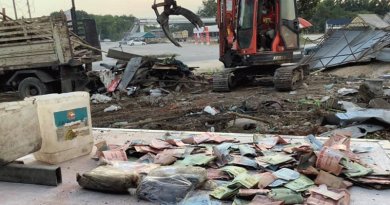Brazil’s woes a boon for Thailand
A MAJOR food industry scandal in Brazil is expected to be a boon for Thailand’s food product producers and exporters, according to a research at a brokerage house.
Brazilian federal police last week held a major operation to raid dozens of meatpackers including industry giants JBS SA and BRF SA after an investigation into alleged bribery of regulators to subvert inspections of their plants, agencies reported.
The probe uncovered about 40 cases of meatpackers who had bribed inspectors and politicians to turn a blind eye on unsanitary practices such as processing rotten meat and running plants with traces of salmonella.
Shares of JBS, the world’s biggest meat producer, and BRF, the largest poultry exporter, fell more than 10 percent in Sao Paulo trading.
The slump in share prices of meatpackers BRF SA and JBS SA was reported early last week after China, Hong Kong and Mexico temporarily suspended imports of Brazilian meat following this scandal.
South Korea also temporarily barred sales of BRF chicken products last Monday. The European Commission said any companies found to be involved in the scandal will be denied access to the European Union market, agencies reported.
Research at Bualuang Securities (BLS) said such phenomena in Brazil is considered a golden opportunity for the Thai chicken meat processors and exporters as exports are expected to rise at least this and next year.
Thailand’s exports of chicken meat to South Korea and Japan are expected to increase as the two countries imported altogether around 537,000 tons of chicken meat from Brazil per year.
Thailand’s exports to EU will not change as its quota there is already full, it said, adding that companies which should be benefiting from this event are CP Foods Plc (CPF), GFPT Public Company Ltd (GFPT) and Thai Food Group Co (TFG).
BLS said the scandal would greatly affect Brazil’s food exports as its Agriculture Ministry temporarily closed three plants cited in the investigation, one run by BRF and two run by smaller rival Grupo Peccin, and began removing their meat products from supermarkets. It also inspected another 21 plants out of the overall 4,871 plants countrywide.
Eumar Novacki, the ministry’s executive secretary, admitted there was some concern that other countries would begin blocking shipments of Brazilian meat while a livestock expert at the University of Sao Paulo said other countries may be eager to block Brazilian exports in the fiercely competitive protein market.
Overall, BLS forecast that the quantity of chicken meat export from Thailand this year would increase to 800,000 tons or around 8 percent from 760,000 tons last year. And such phenomena is likely to push the price of the chicken meat higher.
Mrs Apiradi Tantraporn, Minister of Commerce, as reported by KGI Securities, said South Korea’s Agriculture Ministry has informed Thailand’s International Trade Office in Seoul that it would drop import tax on processed and frozen chicken meat starting April this year.
The move is to prevent price of the products in the country from rising as a result of the ban on Brazilian chicken meat and the spread of Avian influenza or bird flu in its country.
Thailand’s exports of processed and frozen chicken to South Korea are subject to a high import tax rate of 30 and 20 per cent respectively.
CAPTION:
Top: A delicious severing of chicken satay. Photo: Stu_spivack (CC-BY-SA-2.0)
By Kowit Sanandang.



